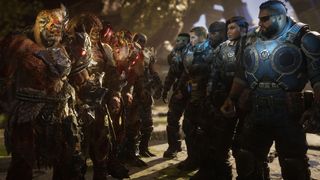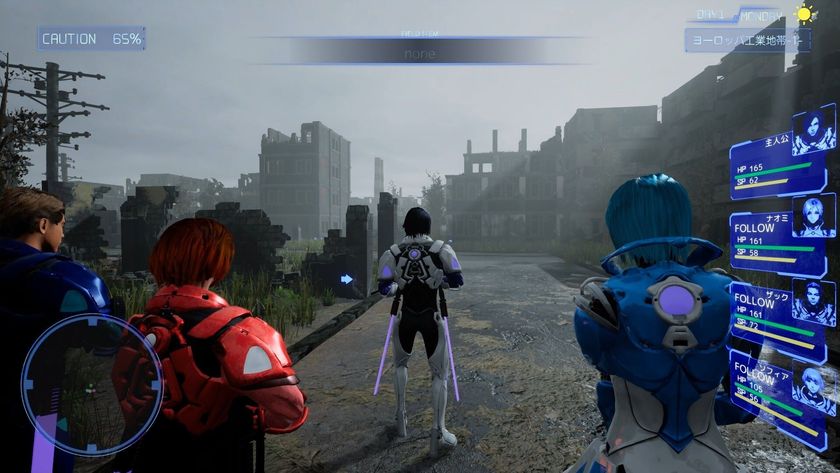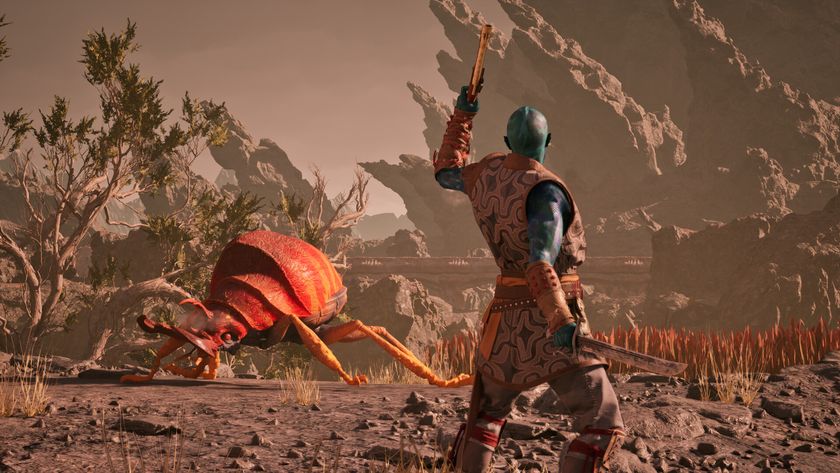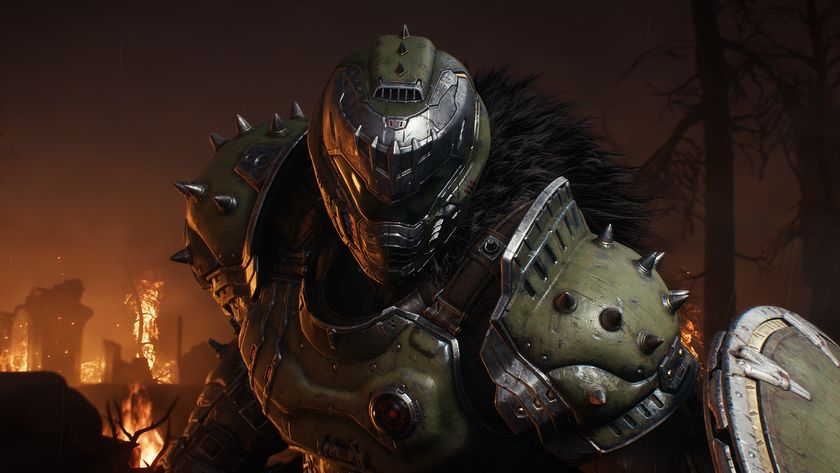12DOVE Verdict
Gears 5 biggest changes don’t reinvent the series, but give the classic shooter more room to breathe. Let Gears be Gears.
Pros
- +
Incredibly detailed visuals
- +
Gears’ signature cover-based shooting still feels great
- +
New upgrade system make collectible hunting feel valuable
Cons
- -
Open-world segments feel unnecessary
- -
Feels samey, despite new mechanics and structural changes
Why you can trust 12DOVE
For the Xbox faithful, Gears of War has been a constant – a port in a storm. After more than a decade and four games – not including spin-offs Gears of War: Judgment and Pop! – it provided top-flight visuals and predictably fun roadie running and chainsaw-gunning for everyone. It’s never wavered, and rarely changed much. Gears 5 – Developer Coalition has cut down the title – is mixing things up a little bit. There are open-world style hubs, an upgrade system, and other nods to larger trends that have found their way into the biggest game franchises. Despite its overtures towards evolution, Gears 5 persists in the tradition of its predecessors: filling arenas and corridors with gunfight after thrilling, hectic gunfight. I went into Gears 5 craving change, but was surprised to find that the parts I enjoyed most were tried and true – every fight constantly challenged me and consistently drew me in. Classic Gears still feels good, even five games later.
Chillin' with my COGs

Gears 5 is a classic middle chapter. It picks up where Gears of War 4 left off: the new Delta squad bracing for war with the Swarm A.K.A. the new Locust, and the game’s new hero, Kait Diaz, is still reeling from unresolved issues around her mother’s death and some lingering questions about her family tree. As those problems come to a head, she and her friends go rogue and head out to get answers and possibly find a way to help keep the Locust at bay.

Release date: September 6 on Xbox Game Pass, or September 10
Platform(s): Xbox One, PC
Developer: The Coalition
Publisher: Microsoft Xbox
Gears 5 has settled nicely into its role as a character “hang out” game: you get more out of spending time with characters you know and love than what they actually do during the campaign. The plot is, frankly, a riff on the boiler-plate “chosen one” story and not much more to speak of. It feels self-contained, but won’t feel particularly compelling if you haven’t played the rest of the series. For Gears of War veterans, the story features a few major twists, but most of them fail to make a huge impact, as they mostly confirm things fans have already known for some time.
And yet I’m never bored by it, because the story is buoyed by its characters. After four games and multiple generations of characters, every person in the Gears universe has a strong voice and grows in some way over the course of the story. Obviously, it’s clearest in Kait, who you come to know and understand much better as she makes the transition from supporting cast member to the player’s perspective. Across the board, though, there’s enough nuance and history in even the most cliche-dependent characters to make every exchange – barking orders, sharing stories, or generally shooting the shit – feel warm and inviting.
After all these Gears… the same war

While so much of Gears 5 seems designed to get you “back in the groove” of the series, structurally there are some big changes in the Gears 5 campaign. Rather than placing you linear levels that flow from one mission to the next, its middle chapters put you in sprawling open-world hubs, where you drive from one mission to another using a paragliding land skiff -- Picture a snowmobile powered by a giant sail instead of a motor. Like the open hub areas of Uncharted 4 and its spinoff, Uncharted: The Lost Legacy, they act more as visual showpieces and palette cleansers than anything else. There isn’t much going on in these spaces, which makes them feel somewhat superfluous. At the same time, they let you control the pace of your experience. Rather than having one chapter flow directly into the next, you can glide around, enjoy the game’s beautiful scenery, and choose whether to advance the story or play an optional sidequest.
That’s right, Gears of War has sidequests now. They’re generally quick hits with minimal story, but they offer a little extra challenge and allow you to get a quick, digestible bite of the campaign. It’s a lot easier to play a side mission than just play 20 minutes of a story mission, as they all tend to be very long, demanding affairs.

They also, more often than not, give you part of a special upgrade item for Jack. In another seemingly huge shift, Gears 5 has a small upgrade tree. Jack, your lovable robot pal from the original trilogy, is back and plays a much bigger role this time around. He fights, he can bring you ammo from far away, and has a set of combat and support skills, which you control. The system has its highs and lows: On the one hand, searching for components adds some much-needed urgency and reward to the collectible-finding aspect of Gears, which has felt outdated for some time. The abilities, which include a blinding flash, a shock trap, and a defense boost, all compliment standard Gears combat nicely, though they don’t always feel necessary. The downside is that there are some very simple, trite puzzles attached to some of the abilities, which feel like busywork.
Similarly, the campaign’s story missions are sprinkled with light stealth segments, where you can systematically reduce the numbers of a big battle by taking enemies out one-by-one. Getting caught simply triggers the fight, so they aren’t offensive, but like the puzzles feel like a very forced way to break up Gears’ repetitive gauntlet of combat arenas.
"There’s nothing wrong with a little good ol’ fashioned AAA spectacle"
For the most part, these changes sound much larger and more substantive than they feel in the moment. Regardless of where you go in the open world, you will find yourself in a classic Gears-of-War-style combat room, and those hectic, tactical shooting galleries are as fun as ever. Though there are only a very small number of new enemies and guns, each encounter feels expertly crafted, escalating the chaos and ratcheting up the difficulty just a little bit every step of the way. In the core missions, set-pieces abound, complete with giant enemies and unique combat scenarios. Everything you’ve ever loved about Gears of War returns in Gears 5, and there’s nothing wrong with a little good ol’ fashioned AAA spectacle.
Fight or flight… and fight

In multiplayer, Gears 5 also feels very comfortable, despite taking some big swings. Both Arcade and Horde mode, the classics, feel almost unchanged from Gears of War 4. Versus, your standard 5-on-5 competitive mode, returns almost completely untouched, but there’s a wide wide array of returning modes, including King of the Hill and Guardian, where you must protect a randomly picked player to keep the respawns flowing. All told, there’s a lot to do, though you may tire of it quicker than usual without anything new to keep you there.
In Horde, both the class system and upgrade cards are now directly tied to specific characters, which gives you more incentive to pick a character and stick to it. Each character also has a unique special ability, which your character choice more important. I personally didn’t love these systems in Gears 4 -- I love a good progression system, but it overcomplicates a mode that I think is good, simple fun all on its own. That said, if you liked these systems in Gears 4, my guess is you’ll enjoy them yet again.

The cards and classes also make their way into Gears 5’s new multiplayer mode, a second, time attack-style PvE mode called Escape. In each match, a squad of three tries to fight its way out of an enemy lair of some kind, pushing its way through at a fast enough pace to outrun the Venom, a green goo that kills everything in its path. It is, in its way, turning Horde mode on its heel: Rather than digging in and fighting wave after wave of a long, drawn-out battle, your team must keep clearing enemies and moving forward to speedrun short, but intense obstacle courses.
Escape feels very trendy. It’s short and snappy, features elements of Battle Royale -- the Venom works a lot like the circle in Fortnite and Apex -- and carries all the hero shooter and card-based mechanics from Horde. There’s a natural intensity to it because of the time crunch, which begets makes you want to take it seriously, especially if you can get a good trio together. I still think that Horde is my go-to multiplayer mode, but Escape adds a new dimension that feels fresh. It is definitely the most interesting of Gears 5’s many shots at innovation.
Gears 5 doesn’t reinvent the wheel, but it changes enough to keep its signature style of cover-based shooting from feeling monotonous. Going into this review, I was convinced Gears of War needed to change drastically or risk obsolescence. But the Coalition has found a different way forward, using new mechanics to polish the old, making the whole game shine.
Mike Epstein is now the Reviews Editor for Popular Science. However, he was once a freelance games and technology journalist covering video games and hardware reviews, features, and more. His words have appeared on Lifehacker, GamesRadar, IGN, Gamespot, PC Mag, and more.

Persona and Metaphor: ReFantazio composer's new JRPG gets a Steam Next Fest demo, and it's basically a turn-based Metal Gear Solid

Avowed is nothing like Bethesda's RPGs, but The Elder Scrolls 6 should take inspiration from its combat

Doom: The Dark Ages developers go back to the OG 1993 FPS for inspiration: "Every time you look at it, you learn something new"
Most Popular





